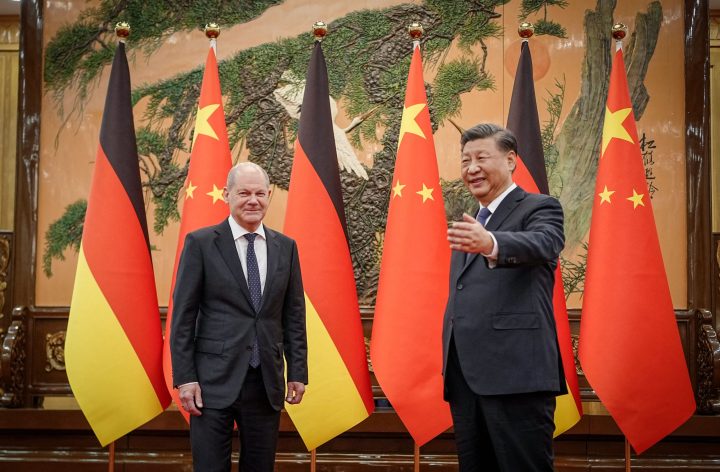
Germany warned about the danger of becoming economically dependent on China
Germany warned about the danger of becoming economically dependent on China

Since the Russian invasion of Ukraine, Germany has taken a big economic hit because of its energy dependence on the Kremlin. After President Vladimir Putin cut off supplies of Russian natural gas to punish Europeans for supporting Ukraine, the Germans have had to spend billions weaning their economy away from an over-reliance on this Russian resource.
But German Chancellor Olaf Scholz has now been accused of making the same mistake again: seeking to make his country economically overdependent on another autocracy. In this case, the claim is that Berlin is in danger of getting hooked on China as a market for German exports.
The main focus of concern has been a recent trade delegation that Scholz led to Beijing, which angered some of Germany’s partners in the European Union and its most important geopolitical ally, the United States.
In strictly commercial terms, however, Scholz had every reason to make the trip to seek better relations with Beijing.
“Germany is probably one of the most exposed major economies to China,” said Matthew Oxenford of the Economist Intelligence Unit. “For example, there are companies like Siemens, there are companies like [Volkswagen], there are even companies like Adidas that have a very big presence in China, and are very interested in maintaining access to the Chinese consumer.”
German-born economist Dr. Stefan Legge, who teaches at the University of St. Gallen in Switzerland, said China is one of Germany’s most important economic partners.
“It’s the biggest source of imports, accounting for 12% of imports into Germany. It’s the second biggest market for German exports. One third of all Volkswagens’ cars are sold in China,” he said.
Legge believes that since Germany is facing some major economic headwinds like higher energy costs for its industry and a rapidly aging workforce, Scholz was right to cozy up to his country’s biggest trading partner.
“Right now, Germany is not in a position of strength and so I think it makes sense to make a deal with China,” he said.
But that does not appear to be the dominant view even in Germany itself. Many of Scholz’s coalition partners seem to have doubts about the wisdom of deepening economic ties with a communist dictatorship, especially in the wake of the fiasco over Russian natural gas.
“Most of the German government, apart from the Chancellery itself, has become very skeptical about the risks of dependency on the Chinese market particularly after the experience they had with Russia recently,” said Andrew Small, senior transatlantic fellow with the German Marshall Fund of the United States, and author of a new book about China’s rift with the West.
Small said Scholz’s trade initiative had alarmed and infuriated some of Germany’s most important partners and allies, like France and the United States.
“I think that the concern with many is that this trip opens the door to China dividing and ruling in Europe, being able to pick individual countries off, and that Germany has just played straight into that,” he said.
Chancellor Scholz shrugged off the criticism. And economist Legge argued Germany has to balance the risk of upsetting its allies against the risk of losing one of its richest markets. It’s a trade-off, he said. The critics should get real.
“We actually come back to what is a German word, ‘realpolitik’ – facing the realities of the world,” Legge said. “You have to deal with countries that you may not like. You have to navigate difficult waters.”
But if the divide between China and the West worsens, if China were to invade Taiwan, those waters would become, for Germany, very difficult indeed.
There’s a lot happening in the world. Through it all, Marketplace is here for you.
You rely on Marketplace to break down the world’s events and tell you how it affects you in a fact-based, approachable way. We rely on your financial support to keep making that possible.
Your donation today powers the independent journalism that you rely on. For just $5/month, you can help sustain Marketplace so we can keep reporting on the things that matter to you.











